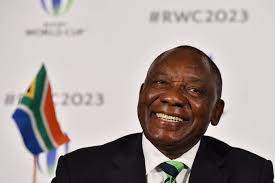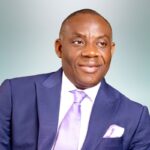South Africans went to the polls with much expectations, riding both on the conduct of the elections and the outcome. In the buildup to the elections there were indications that a seismic political change was about to happen, with issues ranging from disappointment felt against the ruling African National Congress (ANC), the rising political fortunes of the main opposition political party, the Democratic Alternative (DA), as well as fringe parties like the Economic Freedom Fighters (EFF), led by Julius Malema and Mkhonto we Sizwe of former President Jacob Zuma.
Although the elections took place under a lot of tension, mainly as a result of incendiary rhetorics by the candidates of the parties, it was much to the credit of the South Africans that it turned out to be free, fair and peaceful. Much of the credit for that goes to the Electoral Commission of South Africa, the organisers of the elections, which ensured a level-playing field for all the parties and their candidates. The commission also provided the necessary election materials throughout the country and scrupulously kept to the timetable and process.
It was this efficient attention to detail by the South African electoral commission that largely contributed to the peaceful and commendable conduct and outcome of the elections, which foreign observers attested to.
The elections recorded an impressive 60 per cent voter turnout, 90 per cent polling units opening on time, and near absence of technical or human glitches. There was also provision for diaspora voting and real time updates on the election as it progressed.
Going into the elections, several permutations indicated that the ruling ANC was losing ground, especially among its core support areas, the black segment of the country’s population. This was due mainly to the widespread allegation of corruption against the party and the failure to keep to its pledges to uplift the condition of the black population.
Many black South Africans are disappointed and dismayed that the party of Madiba Nelson Mandela had been performing poorly over the years since the overthrow of the apartheid system. Poverty levels among South Africans, especially among blacks, have heightened to a dangerous point of near social revolt. The ever widening social and economic gap between black and white populations is reaching alarming proportions.
There was also the rearing head of ethnic sentiments thrown into the campaigns. This was mainly what the embattled former President Jacob Zuma, who was expelled from the ANC due to his conviction on corruption charges and anti-party activities, sought to pursue. Charismatic and hugely popular in his home base of Kwazulu Natal province, Zuma tried to turn the tables against the ANC by rallying round his Zulu people in the run-up to the elections.
The main opposition party, the Democratic Alternative, a coalition of mostly white and coloured people based in the Eastern Cape region of the country, is largely seen suspiciously as a rear guard party of the old white supremacist, Afrikaner based National Party, which ruled South Africa and was responsible for installing the now dismantled apartheid system during its ruling days.
Then there is the radical EFF of the charismatic Julius Malema, whose fiery rhetoric on land reforms and transfer of economic rights to black South Africans unsettles even some of the blacks.
The outcome of the elections, in which the ruling ANC saw its near stranglehold on power reduced from 90 per cent when it first came to power in 1994, to 40 per cent in the elections, puts South Africa on a political knife edge. The result of the elections puts the DA at 21 per cent, Zuma’s MK party at 14 per cent and EFF at 9 per cent.
Lacking a clear parliamentary majority to form a government for the first time since it came to power, the ANC needs either to rule by forming a coalition with two of the parties or a government of national unity, involving all the four major parties. In the end, the ANC entered into a coalition with its arch rival, Democratic Alliance, which saw Ramaphosa being reelected as president.
But to the rest of Africa, especially Nigeria and beyond, the South African elections offer lessons in electoral organisation and conduct by the electoral umpire and political parties, nuanced issue-based politics devoid of ethnic and religious colouration, transparency and non-interference in the electoral process.
It was these factors that enabled the peaceful conduct and outcome of the South African elections, in which all the political parties invested their faith, leading to the commendable rancour-free election atmosphere in the country. On this score, South Africans have set a standard worthy of emulation by African states struggling to deepen their democratic processes.

 Join Daily Trust WhatsApp Community For Quick Access To News and Happenings Around You.
Join Daily Trust WhatsApp Community For Quick Access To News and Happenings Around You.


